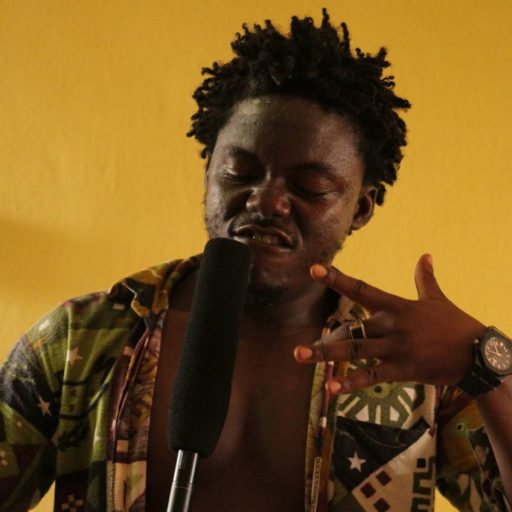Konya Shamsrumi: What is the process of writing a poem like for you? Is it a lot of hard work or easy?
Samuel Ugbechie: It helps when I have a line to start with. If there’s no first line, I have to find one. It’s roughly about getting the verbs and nouns and the other word classes into their proper spots to make them sing the songs they alone can sing. I write with my ears, my heart, my head, and my eyes. And growing older and learning more about the varicolored anatomy of a poem, it takes more time and silence to get the work done. Sometimes it’s hard and sometimes it’s easy. But it’s rarely quick. Sometimes a poem demands days to complete and then it demands a later time to be revisited and reedited. I write to sing, and for me, each line (by line I don’t just mean the typical line a line-break makes, but each line of a sentence fragmented by a punctuation mark) must be musically self-sufficient. Must be a song of its own.
The more I learn as a student of the art, the better I get at attempting to sing down a piece of poetry with the right key and pitch and tone.
Konya Shamsrumi: Please describe your sense of identity in this or any possible world in imagery or metaphor?
Samuel Ugbechie: If a poem were simply sound, I would be an alloy of the metallic elements that carry its singing waves over distance. If it were simply water, I would be more of a sluice than a spillway. But poetry sounds and smells and tastes and feels and reads and looks like both, and more, so it demands a human-conduit: one that bears the burden of the five senses. And I am just one of the many humans through which it makes its way into the world. There’s a poem in the gong of grief belling through the night. The slice of a glance, the burr of a river, the blur of the sun edging into noon. My job, then, is to capture the instance of these and conserve it.
Konya Shamsrumi: If any of your poems could literarily save a person’s life, which poem would it be and can you describe the person whose life you think it would have saved?
Samuel Ugbechie: I don’t think I’ve written a poem that could save a person’s life yet. I hope to write one someday.

Konya Shamsrumi: What does Africa mean to you, as potential or reality?
Samuel Ugbechie: A work in progress. And one that ticks many fine boxes through some of its recent growth in the arts, and arguably, in technology too, if we look at some of the impressive startups coming out of the continent. What impresses me most is the entrepreneurial spirit that seems to have possessed the entire continent and now reflects in some of the beautiful risks I have seen a number of people take. It’s a long road. Still, it’s nice to know we have some successes to point at.
Konya Shamsrumi: Could you share with us one poem you’ve been most impressed or fascinated by? Tell us why and share favourite lines from it.
Samuel Ugbechie: A poem that comes to mind is “Margaret River Sestets” by Mark Tredinnick. Sinnead Morrisey was one of the judges who named it winner of the then Cardiff International Poetry Prize. She captured my thoughts about the poem in better words: “…this is a work completely at home in its own flow of language: its fluency is breathtaking, not least because it takes so many risks with syntax along the way. There is great originality of description here, a way of making the Australian landscape in which it is embedded flame and sing…”
The line, “I’d rather lie in the poem of your hand,” works, because although it reads and sounds well, Mark Tredinnick seemed to have avoided falling into the trap of using the easier word, palm. In substituting poem for palm (a near homonym), what would have turned out to be cliched, became a fine-sounding original line: one at ease with its own breath; one that leaps off the page. There are many beautiful lines like, “The grasses thrum like a squadron of spitfires…” Then this: “My whole life an addiction to country, falling forever for places / that were never going to be any good for me.”
Then the entire poem flows so effortlessly, like the river it hums and longs for. And reading the poem out loud, it reads so fast and fluently like a river telling its history in its own tongue, and as Sinnead Morrisey said, the poem takes several syntactical risks along the way, and still it succeeds and arrives.
Samuel Ugbechie’s works have appeared in Sentinel UK, Elsewhere Lit, Nottingham Review, Bird’s Thumb, Jalada, and elsewhere. When he isn’t writing, he is either playing basketball, soccer or listening to some debate or music. Some of his works have been recognized in some awards like the National Poetry Competition, Vice- Chancellor’s International Poetry Prize, Frederick Holland Poetry Collection Award, RL Poetry Award.
Twitter: @sunical_s
- Poets Talk: 5 Questions with Chika Jones - April 9, 2018
- Poets Talk: 5 Questions with Nyachiro Lydia Kasese - February 28, 2018
- Heart of Poetry: Tsenongu Moses Terhemba’s On His Neglect of Prose by Ismail Bala - February 6, 2018

















Leave a Reply